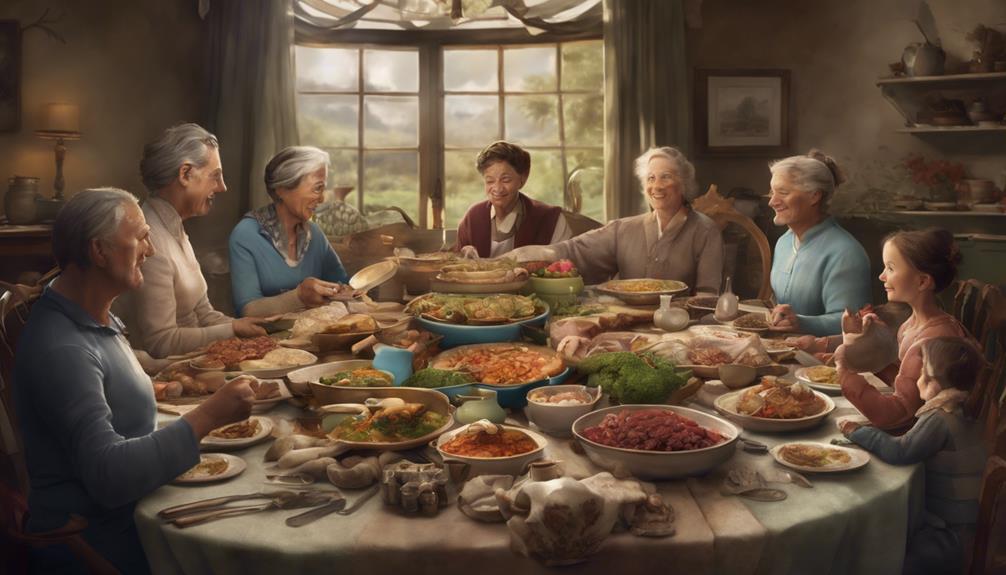Family traditions serve as the cornerstone of familial identity, shaping relationships and values within a family structure. These practices, whether rooted in cultural heritage or developed over time, play a critical role in fostering a sense of belonging and continuity. The significance of family traditions extends beyond mere routines; they encapsulate shared experiences, transmit values, and create a unique narrative for each family. Understanding the depth of family traditions and their impact on individuals can provide valuable insights into the dynamics of family units and the preservation of culture and heritage.
Key Takeaways
- Family traditions strengthen bonds, identity, and connection.
- They provide comfort, stability, and emotional support.
- Positive family dynamics and values are reinforced.
- Trust, communication, and belonging are nurtured through traditions.
Definition of Family Traditions
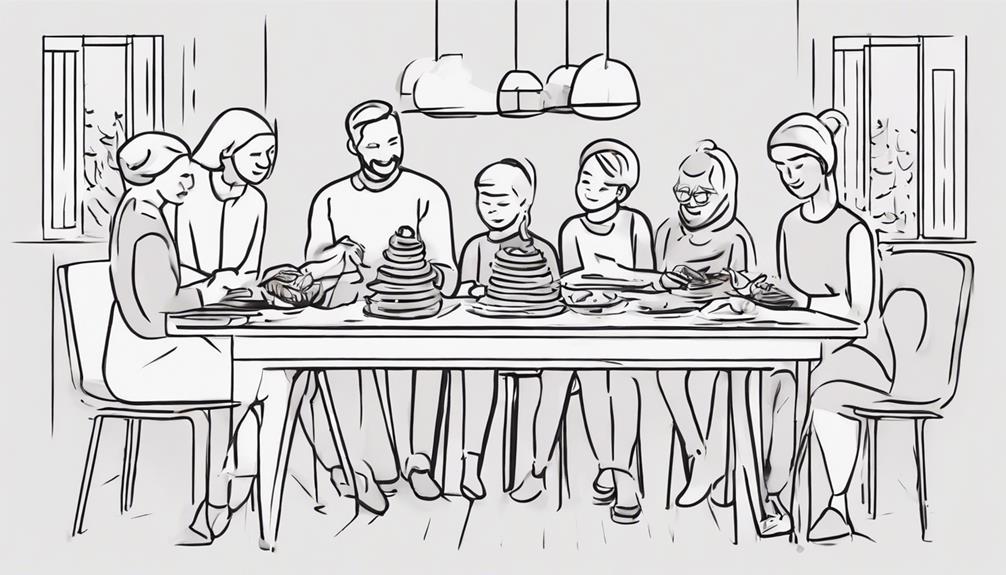
Family traditions encompass a set of activities, stories, or rituals that are transmitted through generations within a family, serving as a foundational element of cultural, religious, or familial customs. These traditions play a vital role in creating a sense of belonging and identity within the family unit. They are essential for maintaining a connection to one's roots and heritage, fostering a deep appreciation for shared values and experiences. The importance of family traditions lies in their ability to strengthen bonds among family members, providing a source of comfort, stability, and unity.
Common Family Rituals
Building upon the foundational understanding of family traditions, the observance of common rituals within familial settings serves to solidify intergenerational bonds and foster shared experiences among its members.
- Decorating the Christmas tree: This annual tradition brings families together to adorn a symbol of festive spirit, creating a shared joyous experience.
- Sharing meals together: Gathering around the table to eat not only nourishes the body but also feeds the soul, providing a space for conversation, laughter, and connection.
- Having movie nights: Watching films together can become a regular ritual that cultivates shared memories and strengthens familial bonds.
- Participating in the tooth fairy tradition: This childhood custom of placing a lost tooth under the pillow in exchange for a small gift can create magical moments and lasting memories for both children and parents.
These common family rituals contribute to the creation of special memories, fostering a sense of unity and belonging among family members. Through these shared experiences, families establish traditions that help shape their identity and strengthen their relationships.
Cultural Traditions Worldwide
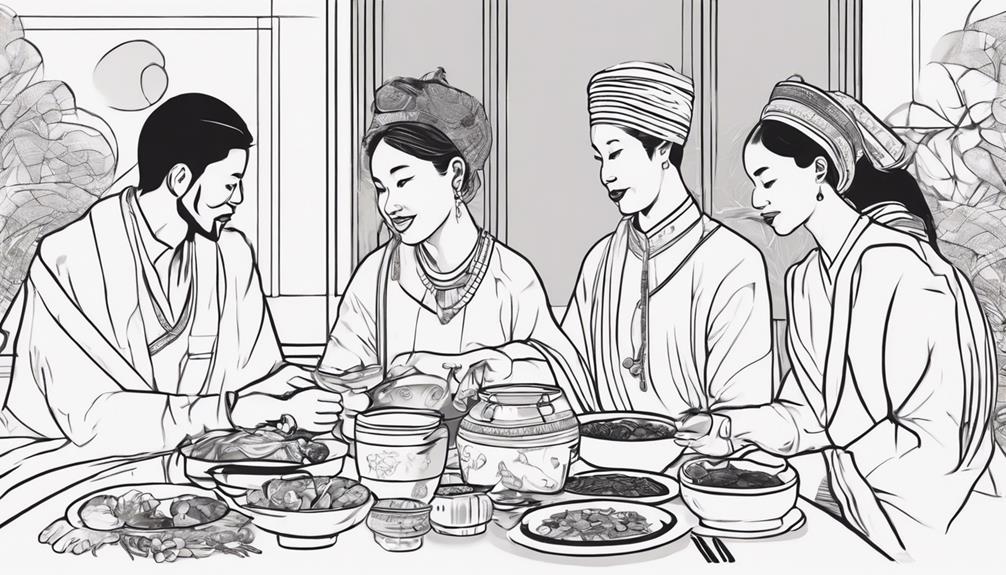
Across diverse societies and geographical regions, cultural traditions serve as integral components of societal identity and heritage preservation. Family traditions, whether cultural or religious, are passed down from generation to generation, shaping family identity and strengthening bonds within the community. In Japan, ancestral veneration is a significant cultural tradition, with rituals and ceremonies honoring past generations. Similarly, Chinese New Year celebrations emphasize family reunions, feasting, and symbolic customs like giving red envelopes for good luck. In Mexico, Dia de los Muertos stands out as a cultural tradition where deceased loved ones are commemorated through altars, offerings, and festive gatherings. The US tradition of Thanksgiving revolves around sharing a meal with family and expressing gratitude, highlighting the importance of familial connections. In Germany, celebrating the first day of school with traditions like gifting school cones filled with treats showcases cultural practices that bring families together and create lasting memories.
Significance of Family Rituals
Incorporating structured family rituals into daily life can significantly impact the cohesion and long-term stability of familial relationships. Family rituals provide a sense of structure and routine, which helps instill values, beliefs, and cultural heritage within family members. They play a crucial role in strengthening family bonds by creating opportunities for shared experiences and lasting memories. Additionally, these rituals offer a sense of security and comfort by providing predictability and stability in an ever-changing world. By engaging in family traditions, individuals feel connected to their roots and to one another, fostering a deep sense of belonging and togetherness. Overall, family rituals contribute not only to the emotional closeness within the family unit but also to the overall well-being and mental health of its members.
Comfort and Security

Family traditions play a crucial role in offering emotional connections within families, fostering a deep sense of belonging among its members. These traditions provide a stable framework that supports individuals during challenging times, offering comfort and security in the face of uncertainties. By promoting stability and support, family traditions contribute to creating a safe and reassuring environment for family members to thrive.
Emotional Connections
Establishing and maintaining family traditions plays a crucial role in fostering emotional connections within the familial unit, providing a sense of comfort and security that is essential for the well-being of its members. Family traditions not only create emotional connections but also offer a foundation for stability and cohesion. They serve as a reminder of shared experiences and values, strengthening the bonds between family members. Additionally, these traditions instill a sense of predictability and reliability in family life, contributing to a feeling of safety and belonging. Through the continuation of these practices, families can find solace and reassurance in times of uncertainty, further deepening their emotional connections and sense of unity.
Sense of Belonging
Consistently maintaining family traditions fosters a profound sense of belonging by establishing a reliable rhythm and order within the familial dynamic. These traditions, through their repetitive nature and predictable occurrence, create a comforting environment where family members can rely on shared experiences and common rituals. By nurturing family connections and promoting interactions centered around these traditions, a sense of unity is strengthened among family members. This unity not only provides emotional support but also contributes to the overall well-being of individuals within the family unit. In a world filled with uncertainties, family traditions serve as an anchor, offering a sense of security and belonging that is essential for maintaining a stable and harmonious family life.
Stability and Support
In emphasizing the inherent stability and support embedded within family traditions, a fundamental framework is established that cultivates a sense of comfort and security within the familial structure.
- Family traditions provide a predictable routine, offering stability in daily life.
- They strengthen family bonds, fostering a supportive environment for all members.
- These traditions act as a pillar of strength, grounding individuals in times of uncertainty.
- By nurturing family connections, traditions create a sense of security and belonging that is essential for overall well-being.
Family Bonding Time
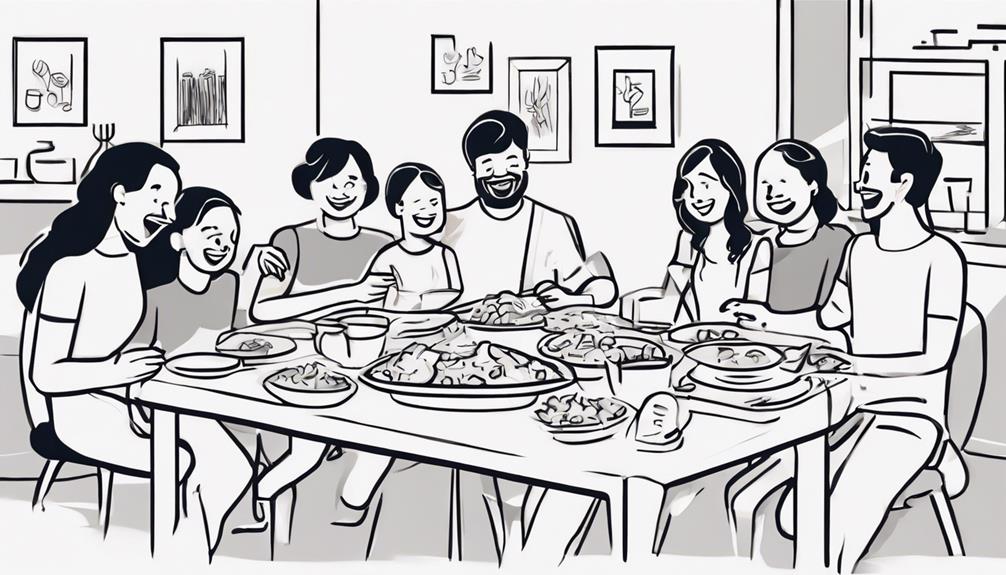
Encouraging regular family bonding time is a fundamental aspect of nurturing strong familial connections and fostering communication within the family unit. Engaging in shared activities during these bonding moments not only promotes a sense of togetherness but also contributes to the development of lasting memories. Whether it involves game nights, movie marathons, or outdoor adventures, these activities play a crucial role in building a close-knit family unit.
Work-Life Balance
Establishing a healthy work-life balance is crucial for individuals to prioritize family time and maintain overall well-being.
- Family traditions help create dedicated time for family activities and bonding.
- They serve as a reminder to prioritize family time amidst work commitments.
- Engaging in family traditions can reduce stress and promote well-being, contributing to a healthy work-life balance.
- Family traditions provide routine and structure, aiding in managing work and personal life effectively.
Family traditions play a vital role in enabling individuals to disconnect from work-related stressors and focus on quality time with loved ones. By incorporating these traditions into their lives, individuals can strike a balance between professional responsibilities and personal well-being. This balance not only strengthens family bonds but also enhances mental health and satisfaction. In a world where work demands can be overwhelming, family traditions offer a grounding force that reminds individuals of the importance of carving out time for family amidst their busy schedules.
Positive Family Dynamics

Positive family dynamics are crucial for the overall well-being of a family unit. Establishing strong family bonds, sharing values and beliefs, and building trust and communication are foundational elements in creating a harmonious family environment. By fostering these aspects, families can navigate challenges effectively and nurture positive relationships that contribute to a supportive and loving family dynamic.
Strong Family Bonds
Within the framework of a family unit, the strength of familial bonds serves as a cornerstone for fostering emotional support and effective communication.
- Strong family bonds enhance emotional support and understanding among family members.
- Positive family dynamics contribute to a sense of security and belonging within the family.
- Healthy relationships within the family help individuals develop a strong sense of identity and self-worth.
- Engaging in family traditions together reinforces the connection and unity among family members.
Shared Values and Beliefs
Shared values and beliefs in family traditions form the foundational framework for fostering harmonious and cohesive family dynamics. Family traditions create a shared understanding among family members, reinforcing core values and beliefs that guide behavior and interactions. This common ground provides a sense of identity and belonging within the family unit, promoting unity and emotional well-being. By upholding these shared values and beliefs, individuals within the family are more likely to exhibit moral and ethical behavior, contributing to positive family dynamics. Through the transmission of traditions, families instill principles that shape character and resilience. Overall, the practice of shared values and beliefs within family traditions plays a vital role in nurturing positive family dynamics and promoting a strong sense of connection.
| Benefits of Shared Values and Beliefs in Family Traditions | |
|---|---|
| Promotes unity and cohesion | Reinforces moral and ethical behavior |
| Establishes a sense of identity and belonging | Shapes character and resilience |
| Fosters harmonious family dynamics | Contributes to emotional well-being |
Building Trust and Communication
Establishing trust and fostering effective communication are essential components for cultivating healthy and functional family dynamics.
- Consistency, reliability, and emotional connection are key elements in building trust through family traditions.
- Shared experiences and rituals enhance communication within the family.
- Family traditions create a safe space for open dialogue and expression of feelings.
- Trust and communication cultivated by family traditions lead to stronger relationships and emotional bonds.
Sense of Belonging
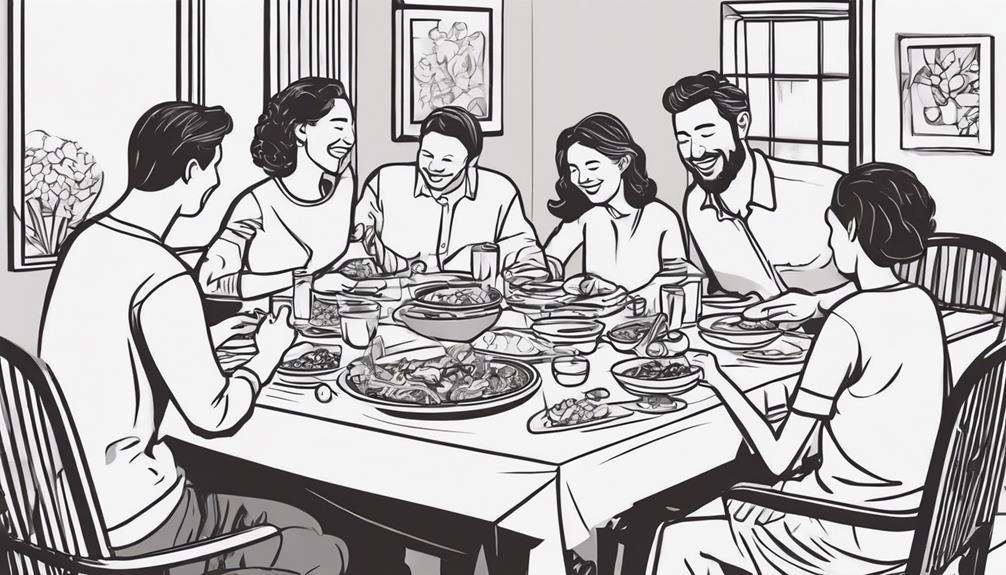
Family traditions play a vital role in fostering a profound sense of belonging within individuals by intertwining them with their family's historical narrative and cultural heritage. These traditions serve as a link to one's family history, creating a feeling of identity and attachment to one's roots. Through the continuation of family traditions, individuals are able to experience a shared connection with their family members, reinforcing familial bonds and relationships. This shared experience not only provides a sense of unity but also helps individuals feel valued, accepted, and deeply connected to their family.
Participating in family traditions contributes significantly to emotional well-being by nurturing a strong support system and a feeling of belonging. This sense of belonging is essential for individuals to develop a positive self-image and a secure foundation from which to navigate the complexities of life. Ultimately, family traditions play a crucial role in shaping individuals' understanding of themselves within the context of their family unit, providing a sense of continuity and stability in an ever-changing world.
Cultural Preservation
Cultural preservation through the maintenance and transmission of family traditions is paramount in safeguarding the rich tapestry of cultural values and practices for future generations. Family traditions play a crucial role in preserving cultural heritage and identity. They ensure that cultural practices and beliefs are upheld and passed down to subsequent generations, contributing to the continuation and enrichment of cultural legacies and histories. These traditions serve as a way to retain and celebrate unique cultural customs within a family unit. Through the preservation of family traditions, a sense of belonging to one's cultural roots is cultivated, fostering a deeper connection to one's heritage. By upholding these practices within the family unit, individuals not only honor their ancestors but also contribute to the resilience and longevity of their cultural heritage for generations to come.
Examples of Family Traditions
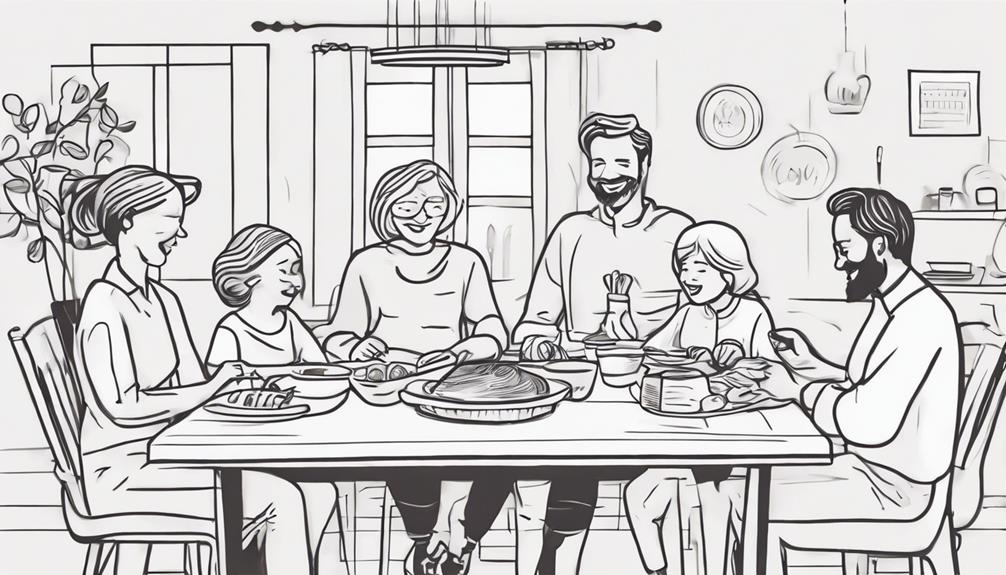
Family traditions serve as a cornerstone in family life, fostering connections and strengthening bonds between generations. These rituals and customs offer a sense of continuity and identity, shaping the values and beliefs within a family unit. By engaging in shared activities and commemorations, families create lasting memories and reinforce the importance of togetherness in nurturing healthy relationships.
Significance of Traditions
How do established customs and rituals within a household contribute to the preservation of heritage and nurturing of familial ties? Family traditions play a crucial role in shaping the identity of individuals and fostering a sense of belonging within the family unit. They strengthen family bonds by creating shared experiences and memories that can be cherished for generations. Additionally, these traditions provide a framework for showing respect for important people and events in a family's history. By upholding these customs, families can instill values, beliefs, and behaviors that are passed down through the ages.
- Family traditions provide a sense of identity and cultural connection.
- They create lasting memories and strengthen family bonds.
- Family traditions offer stability, routine, and predictability in a fast-paced world.
- Traditions help children thrive by providing structure and consistency.
Impact on Relationships
Establishing and maintaining family traditions, such as engaging in regular activities together, plays a pivotal role in strengthening interpersonal connections and fostering emotional bonds within the family unit. Family traditions create a sense of togetherness and provide opportunities for family members to bond over shared experiences. Whether it's weekly movie nights, shared meals, annual vacations, or celebrating special occasions, these traditions help strengthen family bonds and create lasting memories. For instance, celebrating birthdays and anniversaries with unique family traditions enhances the emotional connection within the family, while participating in activities like volunteering together instills values of empathy and teamwork. By engaging in these traditions, families can deepen their relationships and cultivate a strong sense of unity.
| Activities | Impact | Examples |
|---|---|---|
| Shared meals | Foster stronger relationships | Family dinners |
| Annual vacations | Create lasting memories | Beach trips |
| Celebrating occasions | Enhance emotional connection | Birthday traditions |
Frequently Asked Questions
What Is the Significance of Family Traditions?
The significance of family traditions lies in their ability to foster cultural connections, emotional bonds, and shared memories among family members. Through these traditions, values are instilled, a sense of belonging is cultivated, and continuity is maintained across generations. They play a crucial role in identity formation and strengthening generational ties, providing stability and a sense of predictability in an ever-changing world.
Why Is a Traditional Family Important?
Traditional families are essential for fostering bonding activities among family members, ensuring generational connections, promoting emotional stability, and preserving cultural heritage. The structure and values upheld in traditional families provide a sense of security and identity for individuals. These families serve as a cornerstone for societal stability by passing down traditions and values that contribute to the overall well-being and resilience of their members.
Why Do Traditions Matter?
Traditions matter as they connect individuals to their cultural heritage, fostering an emotional bond and sense of belonging within a family. Shared memories and bonding experiences created through traditions strengthen family ties, providing generational continuity and reinforcing values. Meaningful rituals offer stability and comfort in a changing world, contributing to improved well-being and mental health. Ultimately, traditions hold significant importance in shaping family dynamics and fostering unity.
Why Is It Important to Cherish Family Traditions?
Cherishing family traditions is essential as they provide bonding moments and emotional connections among family members. These shared memories and cultural heritage foster strong relationships and a sense of belonging within the family unit. By upholding family traditions, values are transmitted, ensuring generational continuity. This practice not only enriches family life but also contributes to the overall well-being and happiness of individuals within the family structure.
Conclusion
In the intricate tapestry of family life, traditions serve as the threads that weave together generations past, present, and future. Like the roots of a mighty oak tree, family rituals provide stability, nurture growth, and offer guidance to those who stand beneath their branches. Through the preservation of these timeless practices, families uphold their cultural heritage, strengthen their bonds, and create a legacy that endures through the sands of time.
